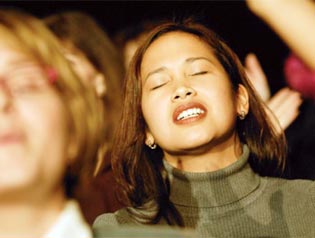 Think of multiculturalism in your congregation as a new menu of opportunities for worship and fellowship
Think of multiculturalism in your congregation as a new menu of opportunities for worship and fellowship
Ever notice when restaurants make changes in their menu, sometimes indicated by a bright splash of colour with the word "NEW!" in it? Some changes are made to adapt to current trends in taste and appetite. Some accommodate new research on what is healthy or not. Some are to take a risk and try new things, or to remove items that are not selling.
William Booth did not operate a restaurant, but he did invite people to "taste and see that the Lord is good!" Seventeen years after issuing the first Orders and Regulations for Field Officers, Booth said, "The Regulations-must not be regarded as a final authority.
...Development has been the order of the Army from the beginning, and will, I hope, remain so to the end. Our methods must of necessity be always changing with the ever-varying character and circumstances of the people whom we seek to benefit. But our principles remain as unchangeable as the Throne of Jehovah." (General Booth, George Scott Railton)
The Apostle Peter was a Jew who followed strict dietary laws. Certain meats were considered unclean, and people who ate those meats were also considered unclean. Jewish Christians would only associate with Gentile Christians who conformed to Jewish dietary laws.
In Acts 10, however, Peter had a vision of a sheet being lowered from Heaven containing all kinds of animals and birds, including those that were ceremonially unclean. A voice from Heaven instructed him to kill and eat these animals. He protested, but was told: "Do not call anything impure that God has made clean" (v 15).
Peter was told to go to the home of a Gentile Christian named Cornelius. By the time he arrived, his mind was changed-he no longer considered Cornelius unclean because of the food he ate. "I now realize how true it is that God does not show favouritism but accepts men from every nation who fear him and do what is right" (Acts 10:34-35). This change of outlook led to explosive growth in the Early Church.
Today's multicultural congregations must accept that changes will occur on various levels of church life because people of different cultures vary in how they think, act and worship. When a monocultural church becomes multicultural there will be noticeable differences in worship style and group dynamics. These differences must be viewed not as barriers but as opportunities for growth.
"There is a temptation among some Christians to expect those who join their church to accept the culture of the church rather than for the current church members to make new changes to accommodate the newcomers," notes author George Yancey in his book One Body, One Spirit. "But it is important that churches learn from newcomers and make some adaptations to facilitate their entrance into the church-It is too much to expect members of the new racial group to completely leave their old culture at the church door without the church making some accommodations for them as well."
Several corps in the Ontario Central Division have been making such accommodations as they welcome diverse people into their midst. They recognize that the most important change of all is a life transformed by the power of Christ. Here's what they're doing:
In worship:
- Equipment is purchased for simultaneous translation of the sermon for people who do not yet speak English
- New flavours of music are incorporated into worship
- Diverse physical expressions in worship are accepted
- Multiple languages are included in PowerPoint presentations
- People of cultural diversity participate in church services
In fellowship:
- Potluck meals are deliciously enhanced by ethnic specialties
- People are not afraid of diverse patterns of thinking and communicating
- Where language is not an issue, small groups are becoming multicultural
- People are realizing that 'friendliness' is not enough. Genuine "friendship" with newcomers is necessary
In policy and structure:
- The focus changes from "What is lost?" to "What is gained?"
- Policies are changed to make integration happen in every aspect of church life
- Strong, culturally unique traditions of the pre-existing church are valued, but some methods of expressing these traditions are changing
by Major Donna Millar,
Divisional Multicultural Ministries Secretary, Ontario Central Division